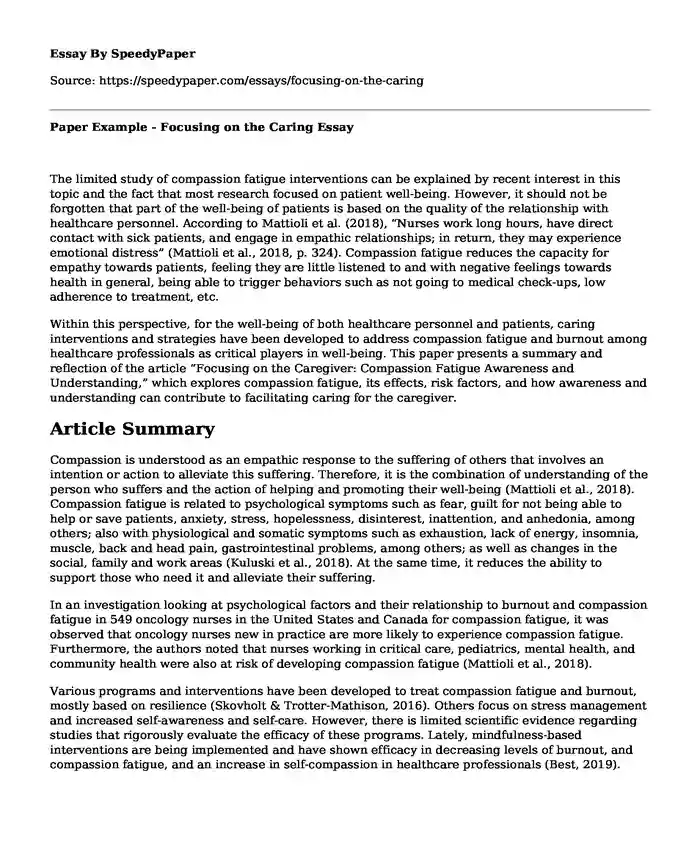
| Essay type: | Analytical essays |
| Categories: | Stress Nursing care Emotional intelligence Essays by pagecount |
| Pages: | 3 |
| Wordcount: | 606 words |
The limited study of compassion fatigue interventions can be explained by recent interest in this topic and the fact that most research focused on patient well-being. However, it should not be forgotten that part of the well-being of patients is based on the quality of the relationship with healthcare personnel. According to Mattioli et al. (2018), “Nurses work long hours, have direct contact with sick patients, and engage in empathic relationships; in return, they may experience emotional distress” (Mattioli et al., 2018, p. 324). Compassion fatigue reduces the capacity for empathy towards patients, feeling they are little listened to and with negative feelings towards health in general, being able to trigger behaviors such as not going to medical check-ups, low adherence to treatment, etc.
Within this perspective, for the well-being of both healthcare personnel and patients, caring interventions and strategies have been developed to address compassion fatigue and burnout among healthcare professionals as critical players in well-being. This paper presents a summary and reflection of the article “Focusing on the Caregiver: Compassion Fatigue Awareness and Understanding,” which explores compassion fatigue, its effects, risk factors, and how awareness and understanding can contribute to facilitating caring for the caregiver.
Article Summary
Compassion is understood as an empathic response to the suffering of others that involves an intention or action to alleviate this suffering. Therefore, it is the combination of understanding of the person who suffers and the action of helping and promoting their well-being (Mattioli et al., 2018). Compassion fatigue is related to psychological symptoms such as fear, guilt for not being able to help or save patients, anxiety, stress, hopelessness, disinterest, inattention, and anhedonia, among others; also with physiological and somatic symptoms such as exhaustion, lack of energy, insomnia, muscle, back and head pain, gastrointestinal problems, among others; as well as changes in the social, family and work areas (Kuluski et al., 2018). At the same time, it reduces the ability to support those who need it and alleviate their suffering.
In an investigation looking at psychological factors and their relationship to burnout and compassion fatigue in 549 oncology nurses in the United States and Canada for compassion fatigue, it was observed that oncology nurses new in practice are more likely to experience compassion fatigue. Furthermore, the authors noted that nurses working in critical care, pediatrics, mental health, and community health were also at risk of developing compassion fatigue (Mattioli et al., 2018).
Various programs and interventions have been developed to treat compassion fatigue and burnout, mostly based on resilience (Skovholt & Trotter-Mathison, 2016). Others focus on stress management and increased self-awareness and self-care. However, there is limited scientific evidence regarding studies that rigorously evaluate the efficacy of these programs. Lately, mindfulness-based interventions are being implemented and have shown efficacy in decreasing levels of burnout, and compassion fatigue, and an increase in self-compassion in healthcare professionals (Best, 2019).
Conclusion
The interventions aimed at reducing symptoms of compassion fatigue in health personnel are a current topic that has raised interest in recent years. In this sense, caring for the caregiver programs are aimed at raising awareness and understanding to reduce symptoms of perceived stress, compassion fatigue, burnout , clinical symptoms such as depression and anxiety, and negative mood among others.
Reflection
Kuluski, K., Arneja, J., Peckham, A., Goldhar, J., & Nelson, M. (2018). Building a Framework for Caregiver Co-Design and Implementation. International Journal of Integrated Care (IJIC), 18. http://libdatab.strayer.edu/login?url=https://search.ebscohost.com/login.aspx?direct=true&db=a9h&AN=138001579&site=eds-live&scope=site
Mattioli, D., Walters, L., & Cannon, E. J. (2018). Focusing on the caregiver: Compassion fatigue awareness and understanding. Medsurg nursing, 27(5), 323-329.
Skovholt, T. M., & Trotter-Mathison, M. (2016). The resilient practitioner: Burnout and compassion fatigue prevention and self-care strategies for the helping professions. Routledge.
Cite this page
Paper Example - Focusing on the Caring. (2023, Aug 03). Retrieved from https://speedypaper.net/essays/focusing-on-the-caring
Request Removal
If you are the original author of this essay and no longer wish to have it published on the SpeedyPaper website, please click below to request its removal:
Popular categories




